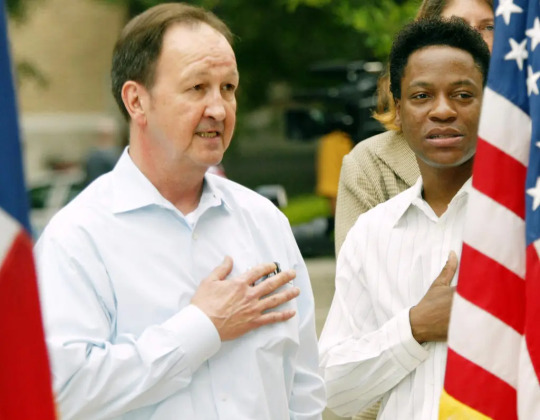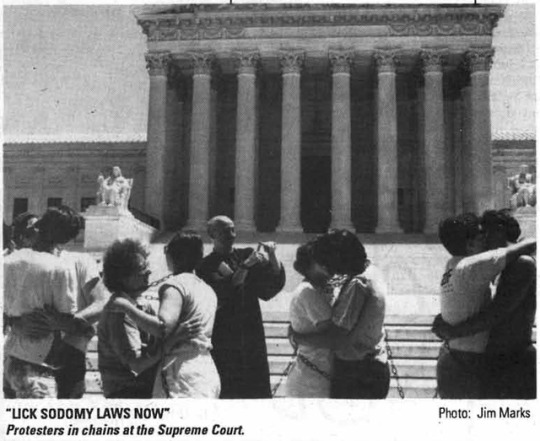#Bowers v. Hardwick
Text
Congressional Responses to Dobbs
With all of the attention focused on the Supreme Court in light of the Dobbs decision Congress' responses have been largely ignored. Here is some context for how Congress' response to Dobbs has gone so far.
The Supreme Court released its opinion in Dobbs v. Jackson Women’s Health on June 24, 2022. Within a little over a month of the release, a robust discussion developed within both Houses of Congress on whether there should be a legislative response to this decision. Congress is notorious for lots of discussion combined with little action. Based on Congress’ recent history, perhaps nothing will…

View On WordPress
#Andrew Clyde#Barbara Lee#Bob Good#Bowers v. Hardwick#Congressional Record#Dick Durbin#Employment Division v. Smith#Lawrence v. Texas#Lisa Murkowski#Reproductive Freedom Act#Respect for Marriage Act#RFRA#Scott Peters#Sylvia Garcia#Voteview
0 notes
Text
James Somerton claiming that the reason gay marriage became a focus of the gay civil rights movement is because only the "boring gay" survived the aids crisis is so unbelievably despicable and such a heinous pack of lies. Anyone with even undergrad introductory level knowledge of the issue knows it's fucking because the US Supreme Court ruled in Bowers v. Hardwick (a case where a gay man was arrested for having consensual sex with another man in his own home) that gay people were not protected by the Constitution's fundamental right to privacy protections, because those protections were explicitly about marriage and family relationships, and therefore states could criminalize gay people's private, consensual sexual behavior because they could never have a legal family relationship. Marriage was a crucial right because it came with a whole host of other rights! There's a conversation to be had about that tactical choice and its consequences but to suggest that marriage became the focus because all the "interesting" gay people died during the aids crisis is straight up monstrous
#like what a fucking piece of shit#how did people love this guys videos lmao#james somerton#hbomberguy#todd in the shadows
337 notes
·
View notes
Text
Laws of Illinois, 1961
Continuing my series of learning about things referenced in the book, I'm looking at things Alex references when he talks about engaging with queer history. These are all tagged #a series of learning about things that are referenced in the book, if you want to block the tag.

John Lawrence, left, and Tyron Garner recite the Pledge of Allegiance at a Houston rally after the Supreme Court's 2003 decision in Lawrence v. Texas that the Texas sodomy law was unconstitutional. Credit -Erich Schlegel/Dallas Morning News/Corbis
When Alex talks about the laws of Illinois, 1961, as far as I can gather he's referring to the sodomy laws which were used across the US in an underhand method to criminalise homosexuality - and in particular Illinois' decision in 1961 to repeal their sodomy law.
Before this, sodomy was as a felony in every state, punished by a long prison sentence or hard labour. The American Law Institute developed a new modernised criminal code, which included the removal of consensual sodomy from the laws prohibiting it. Illinois was the first state to adopt that recommendation, repealing the law against sodomy but adding to their legislation the new crime of "lewd fondling or caress of the body of another person of the same sex" in a public place. While this was amended two years later to say "either sex", the homophobic intent was clear. This focus on ensuring that couples, both heterosexual and homosexual, had the right to privacy in private spaces was enforced again in Illinois, in 1970 with a constitutional amendment. This granted people the right "to be secure in their persons, houses, papers and other possessions against unreasonable searches and seizures, invasions of privacy or interceptions of communications".
Following Illinois' actions, 19 more states repealed their sodomy laws throughout the 1970s. California's repeal took six years of debate and passed in 1975, only after a tie break vote by the Lt. Governor Mervyn M. Dymally. The other states mostly carried out the repeal whilst undertaking a general reform of their criminal laws.
-----
In 1986, the Supreme Court heard Bowers v. Hardwick. This was a challenge to a Georgia law which made sodomy a crime for everyone - not just same-sex couples. Mr Hardwick was arrested after a police officer entered his home with an out-dated warrant for a missed court date. (Hardwick had paid a fine & the issue had been settled three weeks prior.) When the police officer gained access, he discovered Hardwick and another man in bed together, engaging in consensual oral sex. The police officer then arrested both men for sodomy, after Hardwick threatened to have him fired for entering his home without a good reason. The District Attorney decided not to pursue with prosecution as the warrant was invalid as well as his own negative feelings about the sodomy laws being used in such a way. Hardwick then sued the Attorney General of Georgia in an attempt to prove the state's sodomy laws were invalid. After appeals, this made it to the Supreme Court, which rejected his attempt, and upheld the sodomy laws to be valid.
The Bowers case, and specifically the contempt displayed towards gay people in the ruling, became precedent for more discrimination against gay people. The Court argued that it was facetious to argue the fundamental right to privacy protected gay people, and that intimacy between queer couples was entirely unconnected to intimacy between heterosexual couples.
-----
By 2003 ten states still had bans for consensual sodomy, with no specificity regarding hetero- or homosexual encounters, while four states had laws specifically for homosexual couples.
2003 is chosen as a cut off year specifically here, because of a key case that was before the Supreme Court in the first half of 2003, Lawrence v. Texas. In 1998, Lawrence - then 55 - was arrested with his friend Tyron Garner after a false police report of a man with a gun was called in. When officers entered Lawrence's apartment, he was - allegedly - engaging in consensual sex with Garner, violating the Texas sodomy laws. It should be noted that the arresting officer was not known for his honesty, and two of the four officers present didn't report seeing any sex. Lawrence himself denied that they were having sex.
Lambda Legal gay rights advocates seized the opportunity to take the case to the Supreme Court, and attempt to overturn the sodomy laws. In July 2002, attorneys for Lambda Legal asked the Supreme Court to consider three things:
1. Whether the petitioners' criminal convictions under the Texas "Homosexual Conduct" law—which criminalizes sexual intimacy by same-sex couples, but not identical behavior by different-sex couples—violate the Fourteenth Amendment guarantee of equal protection of the laws;
2. Whether the petitioners' criminal convictions for adult consensual sexual intimacy in their home violate their vital interests in liberty and privacy protected by the Due Process Clause of the Fourteenth Amendment;
3. Whether Bowers v. Hardwick should be overruled.
In June, 2003, the Supreme Court issued a 6-3 majority in favour of Lawrence, holding that:
A Texas law classifying consensual, adult homosexual intercourse as illegal sodomy violated the privacy and liberty of adults to engage in private intimate conduct under the 14th Amendment.
In simple words, the sodomy law in Texas was not legal, and the Bowers finding was reversed. Sodomy could not be prosecuted when applied to consenting adults in private.
It was no longer a crime to be gay.
-----
“The core of this opinion is that individuals have the right to choose and define their own intimate, personal relationships,” said R. Bradley Sears, director of UCLA’s Charles R. Williams Project on Sexual Orientation Law. “The connection that was made in the majority opinion is that sodomy doesn’t exist in a vacuum. That conduct exists in the context of gay and lesbian relationships and families.”
"The years have seen the rapid expansion of gay rights, with a state-by-state push for same-sex marriage heading the list. And much of this progress can be traced to Lawrence v. Texas, with its message of tolerance and inclusion in American life." [source]
Sources:
Gay & Lesbian Archives of the Pacific Northwest - The History of Sodomy Laws in the United States, George Painter
Wikipedia - Sodomy laws in the United States
Wikipedia - Bowers v. Hardwick
Wikipedia - Lawrence v. Texas
ACLU - Getting Rid of Sodomy Laws: History and Strategy that Led to the Lawrence Decision, June 26, 2003
San Francisco Chronicle - High court ruling likely to usher in new era for gays. June 29, 2003
NY Times - Strange Justice. David Oshinsky, March 16, 2012
Additional Reading:
Gay & Lesbian Archives of the Pacific Northwest - Lawrence & Garner v. State of Texas
Gay & Lesbian Archives of the Pacific Northwest, originally LA Weekly - It’s About More Than Sodomy - Supreme Court sends gay sex and gay rights out of the closet, July 2003
Advocate - High court rules against sodomy laws, 2003
#elio's#elio's meta#rwrb#red white and royal blue#a series of learning about things that are referenced in the book#long post#alt text added
14 notes
·
View notes
Text
It's Not About Liberals Refusing to Compromise: Respect for Marriage Act Edition
Today, the Respect for Marriage Act passed the House by a 267-157 vote. Forty seven Republicans voted in favor of the bill, dwarfed by the 157 who voted against (all nay votes came from Republicans).
Contrary to popular press coverage, this law does not "codify same-sex marriage". It appears to be far narrower, only ensuring that same-sex marriages performed in one state must be acknowledged in other states. As far as I can tell, it does not forbid states from barring same-sex marriages performed in their borders. In effect, what it "codifies" is not Obergefell but Windsor.
Which makes the overwhelming Republican opposition all the more striking.
This bill could not have been more modest in ambition. It does not simply secure the status quo. It secures a significant retreat from the status quo, at the expense of gay and lesbian Americans' basic civil rights. And even still, Republicans voted against it by more than a 3:1 margin, and its prospects for passing a Republican-led Senate filibuster look dim.
It has been suggested that if Democrats were just a little more moderate, a little less all-in, that Republicans would be willing to work with them. It is the liberals' insistence on going all-or-nothing that compels conservative opposition. Alas, conservatives just can't help themselves. Murc's law strikes again.
No. The Respect for Marriage Act was written to be about as timid and "moderate" as one could possibly imagine without simply running all the way back to Bowers v. Hardwick. And still, it probably won't pass, because Republicans remain overwhelmingly opposed to any degree of equality for gay and lesbian Americans.
That's their position. They're not hiding it. They're not reluctantly compelled to vote against these laws because of some mythic liberal overreach. That's their position. Stop pretending that Republicans don't believe what they clearly believe.
via The Debate Link https://ift.tt/AefdGVo
99 notes
·
View notes
Text
It truly is white cyberpunk writer brain to be living in the United States six years after Bowers v. Hardwick was passed and be like “you who’s really going to be homophobic two hundred years from now? China”
27 notes
·
View notes
Text

Southern voice, September 13, 1990, Andrea K. Brown
[Image description: An article from a magazine written by Andrea K. Brown and titled "SODOMY STARTS TO HEAT UP AGAIN", above the title reads "FEATURE" and below "The Georgia Privacy Coalition wants the 'S' word off the Georgia law books." In the center of the article, breaking the page, is an illustration of a torn dictionary definition of the word Sodomy, torn in such a way where the word, it's pronunciation, and "the homosexual proclivities of t-" "1: copulation with a member-" ":noncommittal and esp. anal or oral-" -posit sex" are the only words visible. the main text of the article reads
"Remember sodomy? It was the hot issue
in SoVo's pages earlier this year, largely as a
result of a controversial sodomy law repeal
demonstration and lobbying campaign on
the first day of the legislative session. ACT
UP staged the demonstration—complete
with inflatable, anatomically complete dolls
arranged in different "sodomitic" positions
—outside the Georgia Statehouse.
No doubt you also remember that the
repeal effort fizzled when legislation that
would have amended the sodomy law to
legalize private consensual sexual acts
between adults regardless of sexual orientation was defeated 6444. An amended version that excluded gays and lesbians from
protection was trounced 87-22 as supporters
of the gay inclusive version withdrew their
votes.
Some blame ACT UP's high-visibility
techniques for losing the reform bill's more
conservative supporters. But others feel that
disapproval of graphic demonstrations is just
a rationalization for homophobia, and that
the law had no chance of passage this year,
regardless of what anyone did or did not do.
For most, the issue has cooled. But in the
minds and hearts—and other parts—of
activists, it still sizzles. "Sodomy" as a criminal term is used to intimidate and harass
gays and lesbians, and as a weapon that may
be wielded in divorce and custody cases, in
criminal trials, and in military and other
forms of discrimination.
In Georgia, sodomy laws prohibit anal
and oral sex regardless of partner
gender—but private consensual sodomy is
not commonly prosecuted
Nevertheless, Georgia has one of the
harshest laws in the country: first-time
"offenders," committing consensual sodomy may be imprisoned for up to 20 years.
Forcible sodomy is punishable with lifetime
imprisonment.
The good news is that there are places in
this country that have made significant
progress on legalizing the way we make
love.
This summer, in both Michigan and
Kentucky, Circuit Court judges struck down
sodomy laws, using state constitutional privacy protections as grounds for their rulings.
These are the first decisions applying to
homosexual sodomy since the U.S. Supreme
Court's infamous 1986
Bowers v Hardwick case.
In Fayette County, Kentucky, the state law— which
criminalizes same sex sodomy
only—was declared
unconstitutional. The decision presently applies to the
Lexington area only, but, since the state
Attorney General is appealing, it could soon
apply to the whole state.
A Wayne County, Michigan judge ruled
that state laws against sodomy (defined in
Michigan as anal sex between partners of
any gender) and gross indecency (oral sex
and mutual masturbation, also without
regard to sexual orientation) violate privacy
rights, in the case of non-public consensual
sex between adults. The case may or may
not be appealed.
In Hardwick, the Supreme Court's majority proclaimed that "homosexuals do not have a fundamental right to engage in acts of
consensual sodomy" under the due process
clause of the 14th amendment, on which
activists had challenged the punitive Georgia
law. The high court cited "millennia of
moral teaching" as grounds for its decision.
The existence of sodomy laws in 26
states (and D.C.) makes clear the government position that engaging in sodomy is a heinous and abominable "crime against
nature." In some states, the statute is actually
titled with those words, or with a variety of
equally offensive terms. Generally speaking,
there are laws on the books
which prohibit anal and
often, mutual masturbation —whether they all fall under each state's definition of sodomy or not. Seven states prohibit only same sex sodomy. All around the country, advocates of sodomy repeal and/or reform are organizing to make changes at the state
level. There is some visible movement in
Oklahoma, Massachusetts, Rhode Island,
Maryland and Minnesota. Attempts at repeal
have been and/or are being made in
Mssouri, Texas, Tennessee and the District
of Columbia. In Tennessee, the law has been
reformed—reducing sodomy from a felony
with a possible 15 years in the clink to a
misdemeanor with a $25 fine.
Some consider reform of this sort a victory
—a step in the right direction. But others
feel that reform will only make repeal more difficult.
Members of the Georgia Privacy
Coalition (GPC) are among those for whom
the issue of sodomy remains hot. The GPC
was formed in April of this year to lobby for
and create awareness about the upcoming
repeal effort.
The strategy in '91 is, first and foremi
to get the word "sodomy" off Georgia's law
books.
Aggravated sodomy and solicitation of
sodomy are to be covered elsewhere: the
first, under a new "aggravated sexual battery" statute being introduced alongside the
repeal bill—Georgia's rape law does not
presently cover forcible sodomy; the latter
by the amending the solicitation for prostitution statute to include a description of the
deed(s).
In an effort to activate interest in repeal
of Georgia's sodomy statute the National
Lesbian & Gay Law Association and the
Lesbian/Gay Rights chapter of ACLU
Georgia will sponsor a Sodomy Track Day,
October 8, as part of the Lavender Law
Conference, to be held in Atlanta.
Workshops, organized by Sue Hyde,
Director of the Privacy Project of the
National Gay and Lesbian Task Force, will
include information on post-Hardwick state
court challenges and legal strategies, penal
code revision and recodification, and legislative repeal/reform. Registration info for the
Conference is contained in an ad on page 3
of this issue.
The Georgia Privacy Coalition meets the
fourth Wednesday of every month.
Networking is essential to eventual
sodomy repeal; contacts outside of Atlanta
are particularly needed. Call the GPC at
286-2358 /end id]
#queer history#magazine#queer magazines#magazine clippings#queer rights#sodomy#lgbt rights#politics#georgia
13 notes
·
View notes
Text
sorry but it's just like. exceedingly fucking clear to me that republican controlled state legislatures across the country are testing how far they can go right now. bills like tennessee house bill 0009, kentucky house bill 173, and kentucky senate bill 150 are intended to see how far the current political and judicial climate will allow them to restrict the rights of queer people. republicans did this for a little over a decade before they got roe overturned. (source: the first heartbeat bill was filed in ohio in 2011.)
they are setting up to challenge obergefell and lawrence v. texas. the majority opinion of roe cites the due process clause of the fourteenth amendement, arguing that abortion bans violate a right to privacy. obergefell guarantees the right of same-sex couples to marry through the due process clause and the equal protection clause of the fourteenth amendment. the majority opinion argues that marriage is a private decision the state cannot intrude on, citing loving v. virginia (also based on the due process and equal protection clauses of the fourteenth amendment). the equal protection clause protects same-sex couples from being barred from marrying while their opposite-sex peers can marry freely. the majority opinion of lawrence v. texas cites the due process clause as granting same-sex couples a "protected liberty interest" to have private sexual relations. in a concurrence, justice sandra day o'connor cites the equal protection clause as the reason gay sex should be decriminalized. (note: in some states only same sex intercourse between men was criminalized. in others same sex intercourse between women was also criminalized. in still others anal sex was criminalized regardless of whether the participants were of the same or opposite sex. the texas law being challenged in lawrence criminalized anal and oral sex between men only. the lawrence case made it legal for same-sex couple to have sex for the first time in FOURTEEN STATES. that's 28% of the country.)
bills like tn hb 0009 (which would criminalize "male or female impersonators" (i.e. drag performers) from performing in public; a second offense would be a FELONY), ky hb 173 (a don't say gay bill that would "establish limitations on school personnel related to instruction and discussion on sexual orientation, sexual preference, or gender expression," among other fucked up things), and ky sb 150 (which would force schools to out trans and nonbinary kids to their parents and prohibit schools from making teachers use kids' preferred pronouns) are clearly pushing at the limits of legality. they are trying to get the supreme court to uphold these laws when they are challenged so the conservative supreme court can say that according to historical precedent (cited in overturning roe) and publicly agreed upon morality (cited in bowers v. hardwick, a case that upheld georgia's sodomy law in 1986, which also cited historical precedent). whether publicly agreed upon morality actually condemns queer people is unlikely to matter, given the current leanings of the court.
this is all to say: we have to start paying very close attention. a felony charge means you can't vote. they are trying to make sure we can't vote. we have to start calling our legislators. we have to start engaging our politically unengaged friends. we have to. they are coming for us. they are playing the long game. we need to too.
i spent multiple hours researching this and i would appreciate reblogs. it feels like we have come to this crisis point so quickly. obergefell isn't even a decade old. we cannot be comfortable and we must act.
#u.s. politics#roe v wade#obergefell v. hodges#lawrence v texas#i'm just so fucking tired#and i know that if you like me are between the ages of 18 and 25 you probably started paying attention to politics#sometime between obama winning his first election and 2016#and so you don't remember how hard we had to fight to get here#i know i certainly don't remember all of this. i've just done my research.#but we don't all remember what it feels like to not be allowed to have sex or to get married#and that feeling is a powerful motivator#i know for me there is a difference between my fear of roe being overturned before it was#and the fear i felt when i woke up and read the decision#anyway.
1 note
·
View note
Text
Corpses have more rights over their bodies than someone with uterus does now.
If I die, you can't take my organs to save another life if I didn't consent. Period.
Furthermore your family can refuse to allow your organs to be donated after your death, EVEN IF you consented in life.
A fucking corpse has more bodily autonomy than a woman does in 2022 America.
Not only is bodily autonomy a human right, it is the foundation upon which other human rights are built.
And it was just hit with a sledgehammer in America today.
This is a dark day for America.
This is a dark day for Americans.
This is a dark day for religious freedom.
This is a dark day for anyone with a uterus in America.
In Texas right now is a law that bans abortion after six weeks. It only allows only private citizens, not state officials, to enforce it's abortion bans. That provision keeps the law from being challenged as unconstitutional in federal court. Any person can enforce state law. Anyone. And get a payment from the state for doing so. Because it specifically bars state officials from enforcing the law, it can't be challenged in federal court.
Idaho’s law bans abortion after about six weeks, and allows family members (including a rapist’s relatives) of the “preborn child” to sue a provider who performs an abortion. Totally legal.
Missouri favors a bill that allows private citizens to sue an out-of-state abortion provider, or even someone who helps transport a person across state lines for an abortion.
What's more, if a far-right SCOTUS can overturn Roe v Wade, a decades-long precedent, they can overturn Romer v. Evans, aka: when the court found that 14th Amendment’s equal protection clause applied LGBTQ. It declared laws can't single-out LGBTQ people to take away their rights.
It can overturn Griswold v. Connecticut. A case that struck down a state ban on contraceptives
It can overturn Bowers v. Hardwick.
The court at the time found that the due process clause of the fourteenth amendment gave the petitioners “the full right to engage in private conduct without government intervention… The Texas statute furthers no legitimate state interest which can justify its intrusion into the individual’s personal and private life.” it was the 2003 landmark ruling that declared all laws in the US making gay sex a crime unconstitutional. That individuals have: “the full right to engage in private conduct without government intervention… ".
It can gut Obergefell v Hodges. The landmark ruling that Kennedy declared: “It is demeaning to lock same-sex couples out of a central institution of the Nation’s society, for they too may aspire to the transcendent purposes of marriage."
This is not hyperbolic. Republican Senators have already made these comments questioning decisions that made state bans on contraceptives unconstitutional, decisions that made states recognize same-sex marriage, and even Loving v. Virginia. That one btw declared that laws banning interracial marriage violate the Equal Protection and Due Process Clauses of the Fourteenth Amendment
Sitting SCOTUS Justice Clarence Thomas himself has already made clear he wants the court to overturn the cases that legalized marriage equality, same-sex intimacy, and the right to use birth control. Specifically he stated:
"For that reason, in future cases, we should reconsider all of this Court’s substantive due process precedents, including Griswold, Lawrence, and Obergefell. Because any substantive due process decision is demonstrably erroneous."
Red.
Fucking.
Alert.
Republicans must not be allowed anywhere near control of congress. It is very clear that there will be no system to protect us from their dreams to turn America's laws, protections, and established rights back half-a-century.
4 notes
·
View notes
Text
History of the Gardens:
youtube
The house and garden were first constructed by Sir William Cavendish and Bess of Hardwick in 1555. The Elizabethan garden was much smaller than the modern garden is now.

There was a formal plot to the south with ponds and fountains, a terraced hill to the east, and a deer park surrounded by a high wall. Between the mansion and the River Derwent, fish ponds were dug. The greatest visible relic of this period is Queen Mary's Bower, a squat stone structure. Bess died in 1608, and nothing remains of the garden work done by Bess's immediate successors at Chatsworth, the 1st, 2nd, and 3rd Earls of Devonshire. The 4th Earl, who became the 1st Duke of Devonshire in 1694, had a penchant for architecture. Over the course of several years, he renovated the Elizabethan home in the classical style and added a landscape to compliment it. The Duke was one of the first Englishmen to adopt the trend of creating formal gardens, which was already popular in France, Italy, and Holland. As a result, multiple parterres were carved into the slopes above the home, as well as various fountains, garden structures, and classical statues. The garden inherited by the 2nd Duke (1673-1729) had little alterations. However, in the year before his death, 1728, attempts were undertaken to simplify the geometric patterns of the preceding generation by flattening and turfing the formal parterre on the south front. This work was carried on by the third and fourth Dukes. Except for three large fountains (at the Ring Pond, the Canal, and the Sea Horse Fountain), their ponds were filled in.Topiary and avenues were removed, terraces were levelled and replaced with grass, a ha-ha was built to fool the eye into thinking the garden and park were the same, and trees were planted in seemingly natural clumps in both park and garden, so there was no distinction between the two.

The 4th Duke's major alterations left the garden and park largely as they are now, and his death resulted in nearly a half-century of inaction. The 5th Duke (1748-1811) was rarely at Chatsworth and made only minor alterations, including the erection of the Grotto House in 1798 for Duchess Georgiana. In 1811, the 6th Duke of Devonshire inherited a garden that his father had terribly neglected. The repair was not completed immediately, and the Duke had little interest in horticulture. However, in 1826, the Duke met Joseph Paxton, a pioneering young horticulture whom he hired as head gardener at Chatsworth. Paxton was the most inventive landscape designer of his day, and his effect on Chatsworth's garden is unrivalled. Joseph Paxton, with the help of his wife Sarah, created some of Chatsworth's most famous garden jewels, including the Emperor Fountain and the Cavendish Banana.

The 7th and 8th Dukes (1808-1891 and 1893-1908, respectively) made limited improvements to the garden, preferring to maintain rather than enhance it. The 6th Duke had produced something amazing, but it had come at a high price, and the future Dukes were left to pay his obligations. The two world wars of the early twentieth century had a significant impact on the garden. Both the 9th (1868-1939) and 10th (1895-1950) Dukes saw the garden deteriorate as soldiers enlisted to battle and coal became scarce. The Great Conservatory was one of the most visible fatalities in the garden during this time of austerity. The expenditures of maintaining and restoring this glasshouse were deemed too costly, and it was demolished. The 11th Duke (1920-2004) and Duchess were both avid gardeners who managed the garden's rehabilitation. This is still the case with the 12th Duke (born 1944). Many old elements have been restored, and other significant new features have been installed in the previous 60 years.
Referencing:
1 note
·
View note
Text
13 really bad Supreme Court Decisions
1. Dred Scott v. Sanford (1857): Hands down the worst Supreme Court decision ever, Dred Scott held that African Americans, whether free men or slaves, could not be considered American citizens. The ruling undid the Missouri Compromise, barred laws that would free slaves, and all but guaranteed that there would be no political solution to slavery. The opinion even included a ridiculous "parade of horribles" that would appear if Scott were recognized as a citizen, unspeakable scenarios like African Americans being able to vacation, hold public meetings, and exercise their free speech rights.
2. Buck v. Bell (1927): "Eugenics? Yes, please!" the Court declared in this terrible decision which still stands as good law. In an 8-1 decision written by Justice Oliver Wendell Holmes, the Court upheld the forced sterilization of those with intellectual disabilities "for the protection and health of the state." Justice Holmes ruled that "society can prevent those who are manifestly unfit from continuing their kind" and ended the opinion by declaring that "three generations of imbeciles are enough."
3. Korematsu v. United States (1944): Here, the Supreme Court upheld the internment of Japanese Americans during World War II, finding that the need to protect against espionage outweighed the individual rights of American citizens. In a cruel and ironic twist, this was also the first time the Court applied strict scrutiny to racial discrimination by the U.S. government, belying the idea that strict scrutiny is "strict in theory, fatal in fact."
4. Plessy v. Ferguson (1896): The Court's famous "separate but equal" ruling upheld state segregation laws. In doing so, the Court made sure that the gains of the post-Civil War reconstruction era were quickly replaced by decades of Jim Crow laws.
5. The Civil Rights Cases (1883): Another testament to the Court's failure to protect civil rights, the Civil Rights Cases struck down the Civil Rights Act of 1875. That law sought to ban racial discrimination in businesses and public accommodations. The court, in an 8-1 decision, held that the enforcement provisions of the Thirteenth and Fourteenth Amendments do not allow Congress to prevent non-governmental racial discrimination. It would take over 80 years for the Court to switch course, allowing for the government protection of civil rights in Heart of Atlanta Motel v. U.S -- this time under the Commerce Clause.
6. Bowers v. Hardwick (1986): This decision upheld a discriminatory Georgia sodomy statute that criminalized sexually active gay and lesbian relationships. As Justice Harry Blackmun noted in his dissent, the majority opinion displayed "an almost obsessive focus on homosexual activity." Bowers was overruled in 2003 by Lawrence v. Texas, though unconstitutional anti-sodomy laws still exist in several states.
7. Lochner v. New York (1905): Look, they're not all civil rights cases! In this case, the Supreme Court struck down a New York law limiting bakery work hours to 10 hours a day, finding an implicit "liberty of contract" in the Due Process Clause and giving birth to the Lochner era.
8. Hammer v. Dagenhart (1918): Here, the Court ruled that Congress could not ban child labor in intrastate commerce. Sure, Congress could legislate against gambling and other vices, but whether children were to be kept out of mines and factories was a question only states could decide.
9. Kelo v. City of New London (2005): Taking land from one private party to give it to another is a valid public use under the Takings Clause, the Supreme Court ruled in Kelo. The decision allowed New London to condemn Susette Kelo's land and transfer it to a private developer as part of a "comprehensive redevelopment plan."
10. Lucas v. South Carolina Coastal Commission (1992): A developer purchased vacant lots on South Carolina beaches. The state, seeking to prevent beach erosion, passed a management act which prevented Lucas from building homes on the land. That, according to the Supreme Court, was a total destruction of all "economically viable use" and a per se taking. Not only are the case's factual conclusions implausible, but as UCLA Law professor Jonathan Zasloff notes, the opinion is full of "expressly and needlessly anti-environmental" views.
11. Bush v. Gore (2000): You don't have to be a Democrat to question the wisdom of this Supreme Court case. In a partisan split, the Supreme Court's five Republican appointees halted the recount of contested ballots in Florida, handing the election to George W. Bush. Even Justice Sandra Day O'Connor has come to regret the ruling.
12. Exxon Shipping Co. v. Baker (2008): Want to send a message to corporate wrongdoers? Don't expect the Roberts Court to make it easy. Following the Exxon Valdez oil spill, one of the greatest environmental disasters of the time, and after years and years of litigation, Exxon was finally held responsible for its negligent captain and hit with $5 billion in damages. Then the Supreme Court ruled that Exxon couldn't be subject to punitive damages in excess of compensatory ones, dropping total damages down to $500 million. Not only did Exxon evade billions in damages, the Supreme Court's ruling increased the value of its stock by $23 billion in two days. That was particularly a boon to Justice Alito, who chose to recuse himself from the case because he owned Exxon stock.
13. Citizens United v. FEC (2010): Perhaps the most hated decision from the Roberts Court, Citizens United held that political donations are speech protected by the First Amendment, opening the floodgates to unlimited personal and corporate donations to "super PACs." Though widely unpopular, the ruling isn't going away anytime soon. It would take a constitutional amendment or a new Supreme Court makeup to reverse the decision.
–findlaw.com
Yeah, the Court always gets it right. :(
0 notes
Text
is it's all coming back to me now about anal sex... bc the line about nights of endless pleasure/it was more than any laws allow.... and there were sodomy laws back then (bowers v. hardwick)... ive never stopped thinking about this...
0 notes
Text
It's Not About Liberals Refusing to Compromise: Respect for Marriage Act Edition
It's Not About Liberals Refusing to Compromise: Respect for Marriage Act Edition
Today, the Respect for Marriage Act passed the House by a 267-157 vote. Forty seven Republicans voted in favor of the bill, dwarfed by the 157 who voted against (all nay votes came from Republicans).
Contrary to popular press coverage, this law does not "codify same-sex marriage". It appears to be far narrower, only ensuring that same-sex marriages performed in one state must be acknowledged in other states. As far as I can tell, it does not forbid states from barring same-sex marriages performed in their borders. In effect, what it "codifies" is not Obergefell but Windsor.
Which makes the overwhelming Republican opposition all the more striking.
This bill could not have been more modest in ambition. It does not simply secure the status quo. It secures a significant retreat from the status quo, at the expense of gay and lesbian Americans' basic civil rights. And even still, Republicans voted against it by more than a 3:1 margin, and its prospects for passing a Republican-led Senate filibuster look dim.
It has been suggested that if Democrats were just a little more moderate, a little less all-in, that Republicans would be willing to work with them. It is the liberals' insistence on going all-or-nothing that compels conservative opposition. Alas, conservatives just can't help themselves. Murc's law strikes again.
No. The Respect for Marriage Act was written to be about as timid and "moderate" as one could possibly imagine without simply running all the way back to Bowers v. Hardwick. And still, it probably won't pass, because Republicans remain overwhelmingly opposed to any degree of equality for gay and lesbian Americans.
That's their position. They're not hiding it. They're not reluctantly compelled to vote against these laws because of some mythic liberal overreach. That's their position. Stop pretending that Republicans don't believe what they clearly believe.
via Blogger https://ift.tt/AefdGVo
July 19, 2022 at 09:15PM
4 notes
·
View notes
Photo

Kiss-ln Marks Hardwick Anniversary
Demo Garners National Attention
WASHINGTON [July 17, 1989] — Approximately 50 protesters from throughout the D.C. area gathered at the steps of the Supreme Court June 30 [1989] to mark the third anniversary of the landmark decision upholding state sodomy laws, and to announce challenges to state laws all across the nation.
Chanting rounds of "Hey, hey, ho, ho, homophobia's got to go," members of the National Gay and Lesbian Task Force, D.C.'s Gay and Lesbian Activists Alliance and OUT! (Oppression Under Target) expressed their anger at the court's 1986 decision in the case Bowers v. Hardwick.
In that decision, the Court, by a 5–4 margin, upheld the Georgia sodomy statute, giving the individual states the right to declare private sex acts illegal. Currently 25 states and the District of Columbia have sodomy statutes on the books.
[...]
While D.C. visitors in tour buses passed in front of the picket to take snapshots, the protesters circled about, carrying signs reading "Sodomites Unite," "Lick Sodomy Laws Now," and "D.C. Sucks and So Do We," referring to the D.C. sodomy statute.
[...]
After several brief speeches, the protesters staged an act of guerrilla theater, One demonstrator dressed in a graduation robe (playing the role of a Justice) read aloud the majority opinion in the case while same-sex couples heckled and were wrapped in plastic chains.
The actor then read Justice Harry A. Blackmun's dissenting opinion, and the crowd burst into cheers and applause and staged a round-robin "kiss-in" to the amusement and curiosity of passersby.
"We all live in Maryland, Virginia and D.C. under sodomy laws," [Sue] Hyde [of the Task Force] shouted through a megaphone at the demonstration's close. "It's your political responsibility to break those laws tonight."
— Cliff O’Neill, OutWeek Magazine No. 4, July 17, 1989, p. 22.
#outweek#issue 4#lgbt history#bowers v. hardwick#protest#kiss-in#supreme court#homophobia#sodomy laws#harry blackmun#sue hyde#the task force#gay and lesbian activists alliance#oppression under target#washington dc#news#cliff o'neill#photo#jim marks
93 notes
·
View notes
Photo

The Baxter Manor 2004 #OurHistoryCollection Candle ingredients include: Bergamot and light Floral notes.
Our proprietary vegetable wax is always clean burning inside both of our luxurious glass jars, creating an intoxicating fragrance and glow.
In this year of our LGBTQ+ history, the first legal same-sex marriage in the United States took place in Massachusetts. This came a year after the Supreme Court of the United States voted, in a 6–3 decision, for Lawrence v. Texas, which also reversed Bowers v. Hardwick, and four years after Vermont became the first state to legalize civil-unions between same-sex couples.
#baxtermanor#baxter manor#ourhistorycollection#bergamot#floral#lawrence v. texas#Bowers v. Hardwick#same-sex marriage#gay marriage#the naked candle#thenakedcandle#naked candles#nakedcandles#los angeles#losangeles#weho#westhollywood#west hollywood#pureandsimple#puresimpleingredients#pure and simple#pure and simple ingredients#made in the usa#madeintheusa#made in america#made in los angeles#made in usa#whatsyourscent#what's your scent#gay pride
2 notes
·
View notes
Text
The Recent Role of Separate Opinions
Why have we seen so many concurrences and dissents in the Supreme Court in recent years? Aside from disagreements, statistics help convey that these are attempts to shift the law in different directions

In a 2015 article for the Washington Post reviewing Melvin Urofsky’s book Dissent and the Supreme Court, the David Cole wrote, “What determines a great dissent…is not necessarily the power of the argument but the shifting tides of history…History, not rhetoric or cogency, determines whether a dissent wins out in the long run. Yet by articulating a compelling alternative legal vision, a persuasive…
View On WordPress
#Bowers v. Hardwick#California Franchise Tax Board v. Hyatt#Lawrence v. Texas#Ledbetter v. Goodyear Tire#Lily Ledbetter Fair Pay Act#Melvin Urofsky#Nevada v. Hall#Suzanna Sherry
0 notes
Photo




In this moment, it is shown that the relationship between Yuuri and Victor are in the process of developing, from competitors to student and coach, and eventually, to lovers, this scene in episode four of the animation shows that reflected in Kennedy opinion of Obergefell that even in same-sex relationships, there are attributes that are not simply for procreation, but of higher values that no other type of relation can satisfy. Additionally, the focus of their love around their passion of skating takes away their identity of being seen as two men together, but as two professional skaters falling in love through the series. As an interesting note, throughout the series the gender neutral term of significant other is used, 恋人(koibito) rather than a sexed term for a lover. I think this is significant in the discourse of this series, as the writer Mitsurou Kubo wants the viewers to first and foremost consider them as professional skaters, people, before labeling their identity. This humanizing aspect reflects changes in societal values towards same-sex relationships, rather than just terms of sodomy and mental illness. If viewed via the lens of Bowers v. Hardwick, there would be the view that this scene would be the promotion of homosexuality, which is linked to sodomy, and would be considered illegal. Through the lens of consequentialism, one would find that this relationship by virtue is wrong, and should not be supported. However, due to shifts within the court, as well as shifts in societal views, we can see how we can see their relationships as a relationship between two people, rather a homosexual relationship. I thnk that this animation does an excellent job in the normalization of non-heterosexual relationships, by showing that the parties involved are first and foremost people, not the identities they are defined by.
4 notes
·
View notes